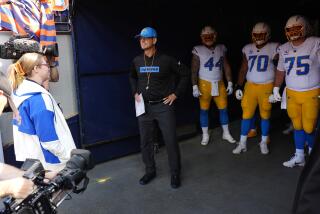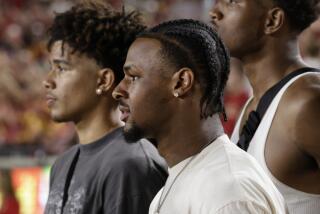Heart Problems Watched Closely Now
- Share via
Doctors say the most significant impact of the sudden deaths of Loyola Marymount basketball star Hank Gathers and, later, Boston Celtic Reggie Lewis, was a heightened awareness of heart problems in athletes.
Gathers and Lewis were both under medical care for heart abnormalities when they died, Gathers on March 4, 1990, and Lewis on July 27, 1993.
“There was an obvious impact that made everybody involved in the care of athletes more cautious and defensive in how they practice,” said William Lang, former chief of primary care for Centinela Hospital and consulting internist for Loyola Marymount.
The celebrity status of the players and their desire to return to play also alerted doctors to the added pressures of evaluating athletes dispassionately.
“These pressures . . . make the job of a well-meaning, dedicated physician harder,” said Barry Maron, cardiologist at the Minneapolis Heart Institute Foundation.
Schools have also made changes. Waivers signed by athletes, releasing schools from liability, have become common. School-employed athletic trainers and coaches are more aware of symptoms and heart conditions and are more likely to be certified in emergency training, which was not always the case previously, experts say.
Guidelines issued by the NCAA include revised recommendations by the American Heart Assn. for cardiovascular screening as part of the physical entrance examination.
NBA teams with an athlete who has a cardiac problem often request an internist courtside, besides the standard-procedure of an orthopedist.
At the research level, recent studies show the inadequacy and need for improvement of screening for athletes of all ages.
“We are talking about a routine physical done in a really serious fashion, not just cursory,” said William Mandel, a cardiologist at Cedars-Sinai Medical Center. “There needs to be a good screening family history, done in the presence of a physician. If someone says, ‘A couple of members of my family dropped dead when they were 30 years old,’ that should make an impact.”
Gathers went to Mandel for a second opinion after tests indicated he had an irregular heartbeat that doctors were trying to control with medication. The underlying cause of the arrhythmia was unknown and needed further testing, which Gathers did not want to do until after the basketball season.
Mandel, who said he had no participatory role, concurred with the opinion of Gathers’ cardiologist, Vernon Hattori. Gathers was eventually cleared by Hattori to play.
“I would say that, after the Hank Gathers affair, doctors are more keenly aware of not being so cavalier about examining athletes,” Mandel said.
More to Read
Go beyond the scoreboard
Get the latest on L.A.'s teams in the daily Sports Report newsletter.
You may occasionally receive promotional content from the Los Angeles Times.










